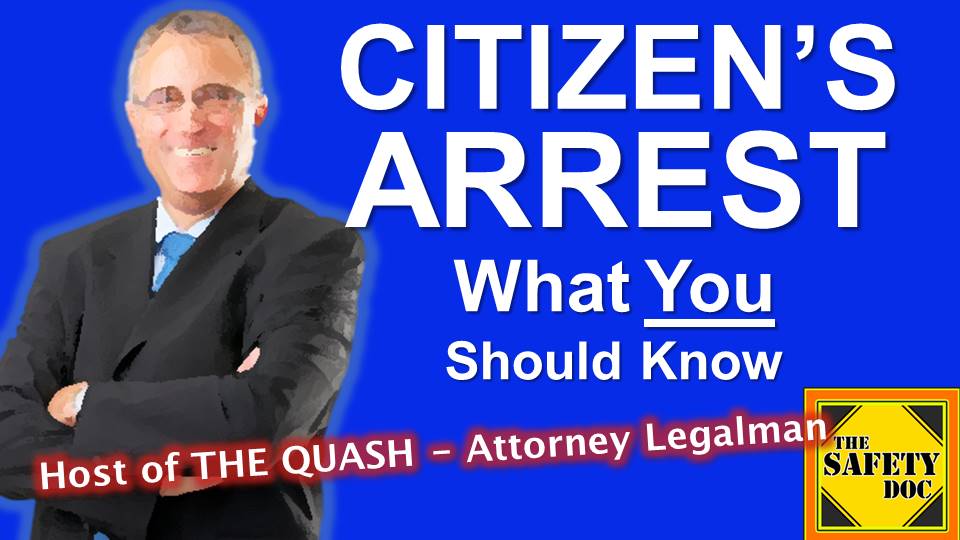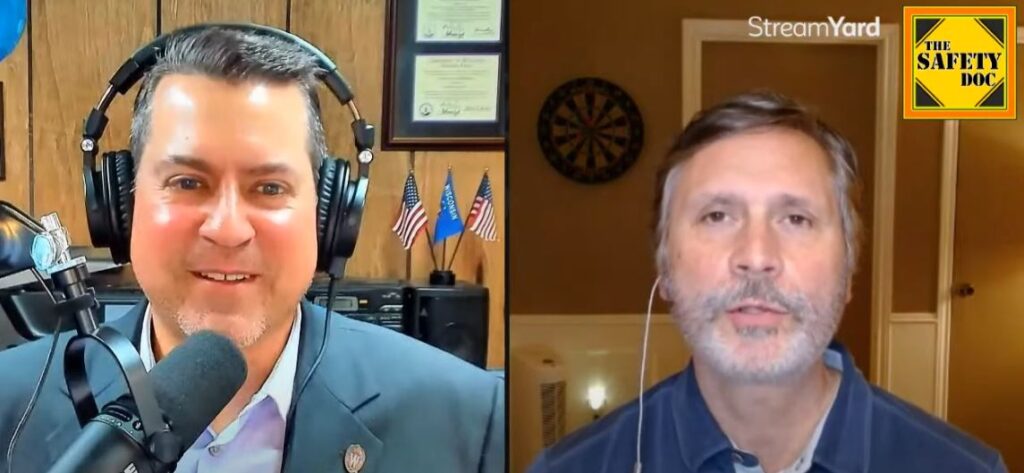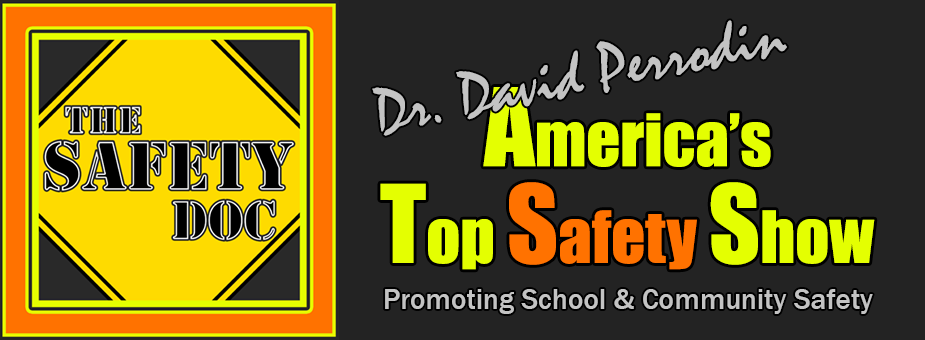Citizen’s Arrest – What You Should Know | Your Jury Trial Rights | Guest Attorney Legalman | SDP193
Can I make a citizen’s arrest? What are the implications of taking matters into your own hands? How might you defend your decision to a judge or jury? The Safety Doc welcomes the Legalman to this episode to address those questions and to delve into the Legalman’s perspectives, juries, voting, political propaganda, and government overreach.

DIRECT LINK to MP3 of this Episode: https://tinyurl.com/SDP193-AUDIO
ABOUT THE LEGALMAN. Legalman’s website states, “Forget left v right. This is the truth about the system from a man who knows. The Quash (podcast) is hosted by a lawyer with 30 years of experience. He unmasks the absurd false narratives we’ve been immersed in 24/7 since birth and laughs at them. There’s a reason nothing about the system ever makes any sense. You’ve been lied to your whole life. But that ends now. Learn more at https://the-quash.captivate.fm/
CAN I MAKE A CITIZEN’S ARREST? Per the Village of Bayside, Wisconsin website, “Wisconsin doesn’t actually have a specific statute regarding citizen’s arrests, but such arrests are covered by common law or judge-made law. Those laws allow citizens to make arrests under one of two conditions. The first is when a citizen has probable cause to believe that the person they are arresting has committed a felony. The second is when someone witnesses a misdemeanor and the misdemeanor is a breach of the peace. Generally, we don’t advise making citizen’s arrests. We do advise calling police and staying on the scene if it’s safe, but safety is paramount. If someone is wielding a knife or attacking someone, he or she may just as easily attack you. Some exceptions apply, particularly when the perpetrator is going to flee. For example, if you see a child being kidnapped and can block the kidnapper’s car from getting away with the child, it may be worth the risk. In addition to safety concerns, you also face legal risks when making a citizen’s arrest. The Fourth Amendment restricts unreasonable searches and seizures, and you could be prosecuted for depriving someone of their constitutional rights. You could also face a civil lawsuit for false imprisonment, assault, or battery.”

JURY TRIAL – THE LAST BASTION OF HOPE? In episode #43 of The Quash, the Legalman explains how the jury trial is a piece of the political structure of this country. How has the jury American trial changed over time, and what obstacles are between a citizen and impartial legal due process? What are the differences between what most people perceive as impartial justice and actual court-delivered “justice” as observed by a lawyer with 3 decades of experience?
FULLY INFORMED JURY ASSOCIATION. Legalman urged people to increase their knowledge about jury trials, noting that, as an example, learning from Fully Informed Jury Association, www.fija.org might empower jurors’ awareness of their right to refuse unjust law. As stated on FIJA’s website, “We will be looking at numerous aspects indicative of the health or lack thereof of jury systems nationwide. We will evaluate the rules as officially spelled out, as well as their functionality in practice, of juries at the federal level, in all fifty states, and in Washington, D.C. with respect to each of these jury health indicators.” People can subscribe, at no cost, to obtain emails from FIJA centering on what’s happening in and around their community.
HOBBES’ LEVIATHAN. Government overreach is a theme in The Quash podcasts, and it was also depicted in Doc’s book, School of Errors – Rethinking School Safety in America. Doc wrote about the Hobbes’ Leviathan (1651) and the social contract. Hobbes’ premise was that people functioned optimally with some basic level of a “sovereign” to facilitate order. But, Hobbes also opined that it was predictable human nature that the governed would progressively surrender their rights (and freedoms) in exchange for progressively more control from the government. Or, the people in power would be unwilling to relinquish it. “To Hobbes, people are plagued by these two forces: the desire for power and everyone else’s annoying desire for power. Everyone would be all for power struggles if they could just concentrate on conniving, but watching your back is a pain in the neck (it would be centuries before Sartre sputtered that “hell is other people,” but surely this is a precursor). A few people enjoy constant drama, but most would rather be left alone if they can’t have all the pie. Therefore, power tends to coalesce into a formal government because most people can’t be bothered to micromanage their power relationships to everyone and everything around them—they would rather outsource that headache, thank you very much (School of Errors, 2019).”
This is episode 193 of The Safety Doc Podcast published on 11-11-2022. This podcast and blog post represent the opinions of David P. Perrodin and his guests to the show. The content here is for informational purposes only. Please consult with your safety professional regarding the unique needs of yourself or your organization.
FOLLOW
- Watch this episode on “The Safety Doc” YouTube channel https://tinyurl.com/SDP193-VIDEO
- Listen to this episode on PodBean MP3 https://tinyurl.com/SDP193-AUDIO
- Apple Podcasts http://tinyurl.com/SafetyDocApplePodcasts
- SAFETY DOC WEBSITE & BLOG safetyphd.com
- Follow David & The Safety Doc Podcast on Twitter @SafetyPhD
- Email Dr. Perrodin thesafetydoc@gmail.com
Purchase Dr. Perrodin’s books
School of Errors – Rethinking School Safety in America
The Velocity of Information – Human Thinking During Chaotic Times
